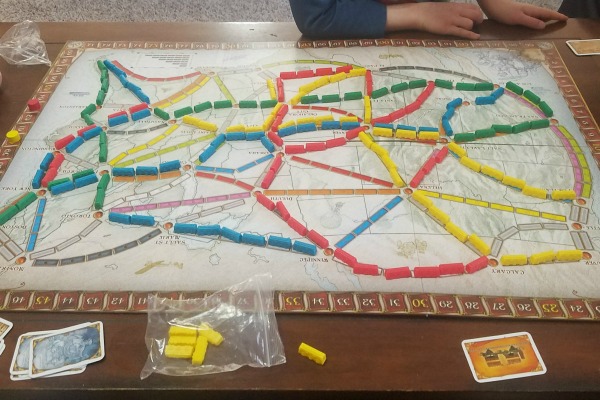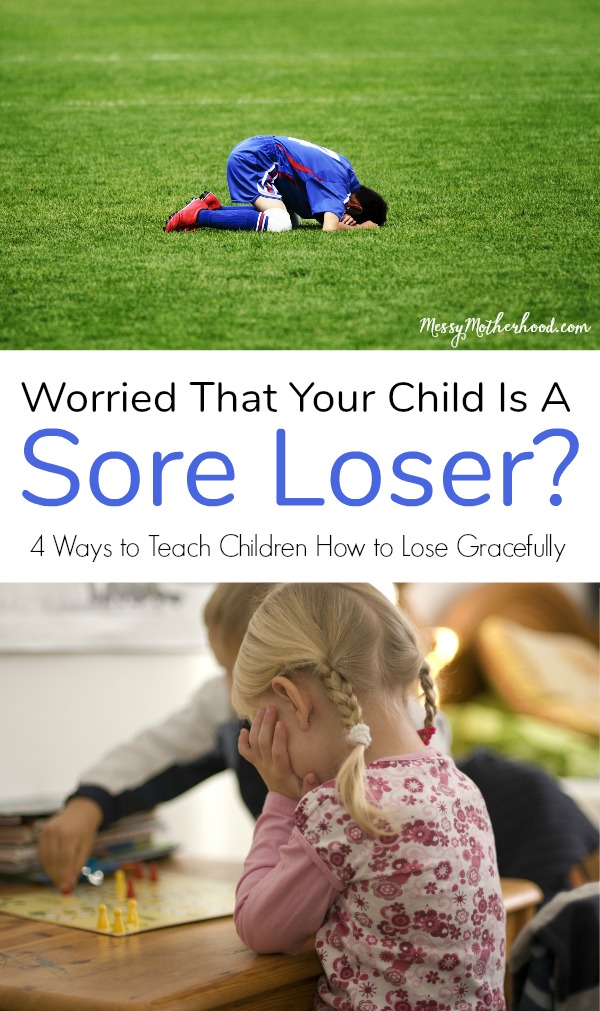Inside: Help your child who hates losing learn how to lose gracefully without the fits of anger and disappointment.
“I’m going to win! I’m going to win” My 8-year-old beams from the other side of the table.
With the game board covered in trains and cards strewn all over the floor, we’re almost done playing our new game, Ticket to Ride.
My son is ahead in points and he’s downright giddy.
My husband pipes up, “okay, I’m out of trains, it’s time to count up our points.”

We start counting and moving our pieces around the board with each point we’ve made.
Then it happens. My son stops counting, he’s done, and I keep going and end up passing him by 10 points.
He looks at me. “Mom! How did you do that?! I was winning!!”
Tears well up in his eyes as he yells “I’ve lost! I’ve lost!”
He sits on the couch behind him, arms crossed, huffing, and glaring at me.
I tempt fate and go sit quietly next to him and I put my arm around his shoulders and gently pull him closer to me.
He pulls away and growls “I’m such a loser.”
Man, this child hates to lose.
Sigh.
I put my hand on his back and say “I’m so sorry you’re upset that you didn’t win. You played really well and you thought for sure you were going to beat us all. Now you’re disappointed.”
“Yes! I’m disappointed! I wanted to win!” my son says through clenched teeth.
“Okay buddy, let’s talk about this. There were 4 players and you came in second place, that’s pretty good. You also had a really fun time playing the game and you really thought you were going to win. It can be so frustrating when things don’t turn out the way you expect. I understand you’re mad.
You’ll get better as you play more, and you’ll win soon.
Tell me, did you have fun playing?”
He sighs, “Yea, I like the game. I just wish I could have won.”
“I hear you buddy, would you like to play again and keep trying?”
He heads over to the board and starts clearing off the pieces and quietly responds with, “Yea, I’d like that.”
This is a VAST improvement from his usual response of yelling, crying, and running to his room in a huff.
My son is a perfectionist and losing is hard for him, but it’s something we’ve been working really hard on.

Helping A Child Who Hates Losing
Losing gracefully without big explosions of anger and frustration is hard for kids, especially for kids who are always striving to be perfect.
But as parents, there are things we can do to help our children handle the defeat well, without getting angry ourselves.
Demonstrate Healthy Reactions
Teaching by example is one of the simplest and most effective ways to help children control their reactions to losses.
Let them see you overcome disappointment, congratulate winners, and hold your head up high when you find yourself in defeat.
Point out how well the winner played and also the things you were proud of in your own performance.
Don’t Always Let Them Win
Many parents make a point to allow their kids to win to help build their self-confidence.
Though this can be a good approach on occasion, children can’t learn how to lose gracefully if they never experience disappointment.
Once they are out in the “real world”, there will come a point where they aren’t going to come out on top and that can be a tough lesson to learn on the fly.
Now, don’t pummel them every time they win, they need to learn how to be a good winner too. But, a loss from time to time will help them learn how to lose gracefully.
Analyze without Blame
Spend a little time talking about why they lost the game or match and what they could have done better.
Focus on places that they can improve and praise the strengths of the winner without being accusatory.
Teach Them The Power of “Yet” and How to Get Into A Growth Mindset
“Yet” is one of the most powerful words in English Dictionary.
When my son yells something like “I can’t win!” I just reply with “Yet! You can’t win, yet.”
Yet is where we start to understand that we can accomplish things we just aren’t quite there yet.
Teach your children the power of “yet,” and that with effort and practice, they will be able to master the game (or math problem, cartwheel, or any other hard thing).
One of the best resources I’ve found to teach children about Growth Mindset and the power of yet is the Big Life Journal. It’s a Growth Mindset Journal for kids.
The 5-day challenges are pretty amazing too.
These challenges helped my son learn the power of “yet,” which is why he was ready to try again when he lost Ticket to Ride the first time.
As he sat up the board again for the next game, we talked about strategy and why I had won the last time.
He’d be happy to tell you that in that second game, he legitimately beat me by 14 points.
He was able to win because he didn’t give up and he learned from his previous loss.
More for you:
- In Defense of the Loud Spicy Family
- 6 Parenting Books That Will Change The Way You See Your Kids
- The Most Powerful Response When Your Child is Inconsolable.

I recall once I was playing the game aggerivation with my youngest son. He had two choices of a moves, well I try to explain the advange and disadvanges.
Well he choice a move. And I ended knocking off his marble.
Although I don’t recall who won the game
Coffee is on
my daughter would get upset very soon if she lost any board game so i always let her win.Once she went at her cousins place to stay for few days and there she had to play an honest and proper rules game with him which made her acceptive about defeat gradually.
after coming back once i was playing with her and she herself said that i will be fine even if i lose this game.I was so happy 🙂
Thanks for this post.
I was wondering: what about being an awful winner? My daughter is really obsessed with winning and gets upset when she loses, but now she’s started to be really unpleasant when she’s on the winning hand: laughing at the other players when they do bad and making rude or mean remarks… Any tips for dealing with that
Thanks!
I also tell my students that games have a component of chance. Some games are ALL chance. Even if they play their best we can’t control how the dice is rolled or what cards are in the deck. It isn’t purely how well someone plays. I try to separate the strategy component with the probability component.